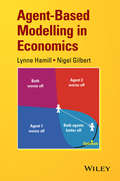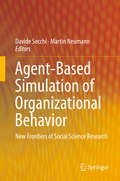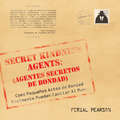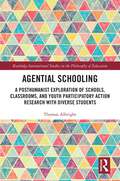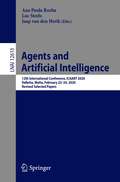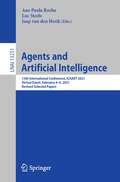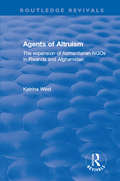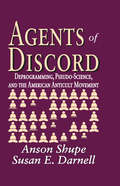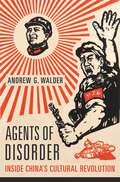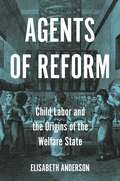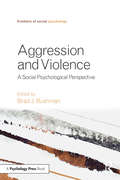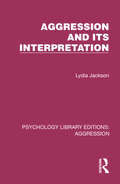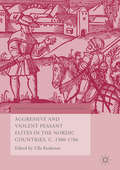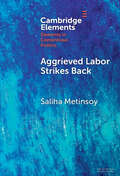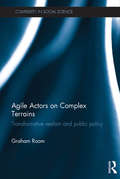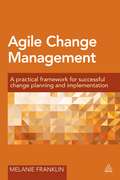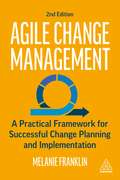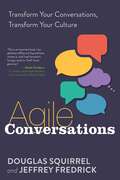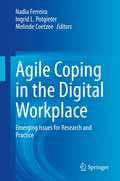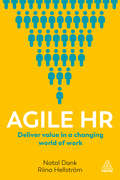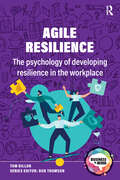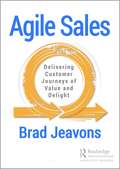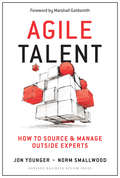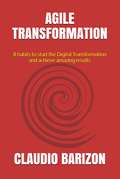- Table View
- List View
Agent-Based Modelling in Economics
by Nigel Gilbert Lynne HamillAgent-based modelling in economics Lynne Hamill and Nigel Gilbert, Centre for Research in Social Simulation (CRESS), University of Surrey, UK New methods of economic modelling have been sought as a result of the global economic downturn in 2008.This unique book highlights the benefits of an agent-based modelling (ABM) approach. It demonstrates how ABM can easily handle complexity: heterogeneous people, households and firms interacting dynamically. Unlike traditional methods, ABM does not require people or firms to optimise or economic systems to reach equilibrium. ABM offers a way to link micro foundations directly to the macro situation. Key features: Introduces the concept of agent-based modelling and shows how it differs from existing approaches. Provides a theoretical and methodological rationale for using ABM in economics, along with practical advice on how to design and create the models. Each chapter starts with a short summary of the relevant economic theory and then shows how to apply ABM. Explores both topics covered in basic economics textbooks and current important policy themes; unemployment, exchange rates, banking and environmental issues. Describes the models in pseudocode, enabling the reader to develop programs in their chosen language. Supported by a website featuring the NetLogo models described in the book. Agent-based Modelling in Economics provides students and researchers with the skills to design, implement, and analyze agent-based models. Third year undergraduate, master and doctoral students, faculty and professional economists will find this book an invaluable resource.
Agent-Based Simulation of Organizational Behavior: New Frontiers of Social Science Research
by Davide Secchi Martin NeumannThe aim of this book is to demonstrate how Agent-Based Modelling (ABM) can be used to enhance the study of social agency, organizational behavior and organizational management. It derives from a workshop, sponsored by the Society for the Study of Artificial Intelligence and the Simulation of Behavior (AISB), held at Bournemouth University Business School in 2014 on "Modelling Organizational Behavior and Social Agency". The contents of this book are divided into four themes: Perspectives, Modeling Organizational Behavior, Philosophical and Methodological Perspective, and Modeling Organized Crime and Macro-Organizational Phenomena. ABM is a particular and advanced type of computer simulation where the focus of modeling shifts to the agent rather than to the system. This allows for complex and more realistic representations of reality, facilitating an innovative socio-cognitive perspective on organizational studies. The editors and contributing authors claim that the use of ABM may dramatically expand our understanding of human behavior in organizations. This is made possible because of (a) the computational power made available by technological advancements, (b) the relative ease of the programming, (c) the ability to borrow simulation practices from other disciplines, and (d) the ability to demonstrate how the ABM approach clearly enables a socio-cognitive perspective on organizational complexity. Showcasing contributions from academics and researchers of various backgrounds and discipline, this volumes provides a global, interdisciplinary perspective.
Agentes Secretos De Bondad: Como Pequenos Actos de Bondad Realmente Pueden Cambiar Al Mundo
by Ferial PearsonFerial Pearson nació y fue criada en Nairobi, Kenya. Es la mayor de cuatro hijas y la primera en su familia directa en ir a la universidad. Después de graduarse del Colegio Poponi en 1997, dejó África para asistir a Gustavus Adolphus College en St Peter, Minnesota, donde en 2001 obtuvo su licenciatura en Enseñanza de Literatura de Artes de la comunicación, y donde conoció a su esposo, Daniel. Se le ofreció la oportunidad de enseñar en el Distrito Escolar Público de Omaha en South High School ese otoño, donde enseñó inglés y lectura. Durante su tiempo allí, también se desempeñó como patrocinadora del Gay-Straight Alliance y Unity Club, y recibió premios nacionales por su trabajo con los estudiantes y la comunidad. Estos incluyen el Premio Virginia Uribe de la Asociación Nacional de Educación por el Liderazgo Creativo en Derechos Humanos en 2012, el Premio al Educador del Año de la Cadena Educativa de Gays, Lesbianas, Heterosexuales (GLSEN por sus siglas en inglés) en 2011, y fue representante de Nebraska y finalistas del Consejo Nacional de Maestros de Inglés Académico Premio a la Libertad en 2012. Localmente, ha sido galardonada con el Premio de Relaciones Humanas de la Asociación Educativa Omaha 2011, el Premio Profesional Prometedor 2012 de la Universidad de Nebraska en Omaha, y el Premio Anti-Intimidación 2011 de RESPECT y un Premio TOYO (Diez Jóvenes Omahans Sobresalientes) en 2014. También obtuvo su maestría en Currículo e Instrucción con un Certificado de Posgrado en Instrucción Urbana de la Universidad de Nebraska en Omaha en 2009. Ferial dejó Omaha South High School para trabajar como Asesora de Talento para la Fundación Avenue Scholars y enseñó para ellos en Ralston High School durante dos años hasta 2013, tiempo durante el cual creó su proyecto Secret Kindness Agents, que se convirtió en el tema de un libro, un TEDx Talk, y fue el foco de su disertación. Actualmente es Profesora Asistente en la Universidad de Nebraska en Omaha en el Departamento de Educación de Maestros. En 2016, recibió el premio Stephen Sondheim Inspirational Teacher del Centro Kennedy. En 2017, ella recibió su Ed. D. en Liderazgo Educativo. Ella vive en Ralston, Nebraska con su esposo Daniel, su hijo Ilahi y su hija Iman.
Agential Schooling: A Posthumanist Exploration of Schools, Classrooms, and Youth Participatory Action Research with Diverse Students (Routledge International Studies in the Philosophy of Education)
by Thomas AlbrightThis book examines how schooling—the restrictive, oppressive, and disciplinary force in much U.S. education—is protean and has the agency to change in response to challenges. Posthumanist theories were engaged with to better understand the intra‑actions between human, nonhuman, and discursive actors.Utilizing participant observations, interviews, cognitive maps, diffraction, and theory, it argues that traditional humanistic approaches to oppression in U.S. education are inadequate to understanding the ongoing power of schooling. In conversation with these paradigms, this book lays out an agential realist (Barad, 2007) view of schooling and argues in favor of examining schooling itself as an agent, sustained and bolstered by a wide range of other agents acting in and around schools—from clipboards and handouts to adultism and racism. This approach offers a new perspective on how oppressive forces like racism, sexism, and adultism adapt and continue to operate in spaces deliberately designed to oppose them, including Ethnic Studies programs and YPAR projects. At the same time, this book rejects totalizing arguments about schooling’s hegemony and shows how a wider recognition of nonhuman agency can help us not only understand but also work to resist such oppressions.It will appeal to scholars, faculty, and upper‑level students with interests in critical youth studies, educational equity, Ethnic Studies, youth participatory action research, and posthumanism.
Agents and Artificial Intelligence: 12th International Conference, ICAART 2020, Valletta, Malta, February 22–24, 2020, Revised Selected Papers (Lecture Notes in Computer Science #12613)
by Jaap van den Herik Ana Paula Rocha Luc SteelsThis book contains the revised and extended versions of selected papers from the 12th International Conference on Agents and Artificial Intelligence, ICAART 2020, held in Valletta, Malta, in February 2020. Overall, 45 full papers, 74 short papers, and 56 poster papers were carefully reviewed and selected from 276 initial submissions. 23 of the 45 full papers were selected to be included in this volume. These papers deal with topics such as agents and artificial intelligence.
Agents and Artificial Intelligence: 13th International Conference, ICAART 2021, Virtual Event, February 4–6, 2021, Revised Selected Papers (Lecture Notes in Computer Science #13251)
by Jaap van den Herik Ana Paula Rocha Luc SteelsThis book constitutes selected papers from the refereed proceedings of the 13th International Conference on Agents and Artificial Intelligence, ICAART 2021, which was held online during February 4–6, 2021.A total of 72 full and 99 short papers were carefully reviewed and selected for the conference from a total of 298 submissions; 17 selected full papers are included in this book. They were organized in topical sections named agents and artificial intelligence.
Agents of Altruism: The Expansion of Humanitarian NGOs in Rwanda and Afghanistan (Routledge Revivals)
by Katrina WestThis title was first published in 27/11/2001: Humanitarian nongovernmental organizations (NGOs) grew significantly in the last decades of the 20th century. The international NGO community today is a rich world of professional bodies, local organizations, mammoth multinationals, charities, advocacy groups, business-like organizations, ad hoc agencies and voluntary associations. Humanitarian NGOs are powerful actors in conflict regions and influential campaigners at the international level. What are the reasons behind their growth? In answering that question, this book focuses on how and when NGOs became influential in humanitarian crises. Four case studies in Rwanda and Afghanistan are examined. The earliest is the crisis in Rwanda in the 1960s, when only a few NGOs operated in Rwanda with limited budgets and experience. The second case study is the Soviet invasion of Afghanistan in 1979-89, by which time NGOs had developed considerably: by then they were operating on a global scale, receiving more funds, having closer ties with the media, executing bigger projects and had also become more professional. The second Afghan case study focuses on the mujahidin and Taliban rule, while the second Rwandan study centres on the 1994 genocide. These two studies reveal that enormous changes have taken place in the humanitarian NGO community since the 1980s. In this way, this book characterizes the changes that have taken place and then offers explanations for the nature and speed of the growth and change.
Agents of Discord: Deprogramming, Pseudo-Science, and the American Anticult Movement
by Susan E. Darnell Anson Shupe"It is widely acknowledged that the United States has always provided fertile ground for the growth of new religious movements and cults, but modern organized efforts to oppose and restrict them have been less well understood. In Agents of Discord, Anson Shupe and Susan E. Darnell offer a groundbreaking analysis of the operations and motives of these oppositional groups, which they generally group under the umbrella term of the anticult movement.Historically there have always been parallel groups opposed to certain religious movements, whether these be anti-Quaker, anti-Roman Catholic, or anti-Mormon. The authors establish the cultural context of such movements in the nineteenth century. They point out the link between modern anticult movements and nativist movements in American history. Turning to the postwar era, the authors discuss the rise of anticult movements and focus specifically on one of the most prominent, the Cult Awareness Network (CAN). CAN was a two-tiered organization. Partly composed of volunteers, donors, and families affected by cult movements, it also included what the authors call an ""inner sanctum"" of behavioral science professionals, attorneys, and deprogrammers. Using never-before-reported data on CAN's activities, the authors cite an extensive history of financial impropriety that finally led to the organization's bankruptcy. They offer a pointed critique, informed by current scholarship, of the ""brainwashing"" model of mental enslavement presented by the anticult movement that has been a central assumption undergirding its activities. At the same time, they show how increasing professionalization has gradually begun a shift of such movements to a therapeutic model of exit counseling that rejects the crude methods of earlier intervention strategies.In their analysis of the anticult movement nationally and internationally, Shupe and Darnell merge sociological concepts and social history to make unique sense of a hereto"
Agents of Disorder: Inside China’s Cultural Revolution
by Andrew G. WalderWhy did the Chinese Communist Party state collapse so rapidly during the Cultural Revolution? Consulting over 2,000 local annals chronicling some 34,000 revolutionary episodes across China, Andrew Walder offers a new answer, showing how the army, brought in to quiet brewing rebellions, escalated the violence that took nearly 1.6 million lives.
Agents of Reform: Child Labor and the Origins of the Welfare State (Princeton Studies in Global and Comparative Sociology)
by Elisabeth AndersonA groundbreaking account of how the welfare state began with early nineteenth-century child labor laws, and how middle-class and elite reformers made it happenThe beginnings of the modern welfare state are often traced to the late nineteenth-century labor movement and to policymakers’ efforts to appeal to working-class voters. But in Agents of Reform, Elisabeth Anderson shows that the regulatory welfare state began a half century earlier, in the 1830s, with the passage of the first child labor laws.Agents of Reform tells the story of how middle-class and elite reformers in Europe and the United States defined child labor as a threat to social order, and took the lead in bringing regulatory welfare into being. They built alliances to maneuver around powerful political blocks and instituted pathbreaking new employment protections. Later in the century, now with the help of organized labor, they created factory inspectorates to strengthen and routinize the state’s capacity to intervene in industrial working conditions.Agents of Reform compares seven in-depth case studies of key policy episodes in Germany, France, Belgium, Massachusetts, and Illinois. Foregrounding the agency of individual reformers, it challenges existing explanations of welfare state development and advances a new pragmatist field theory of institutional change. In doing so, it moves beyond standard narratives of interests and institutions toward an integrated understanding of how these interact with political actors’ ideas and coalition-building strategies.
Aggression and Violence: A Social Psychological Perspective (Frontiers of Social Psychology)
by Brad J. BushmanThis book provides a broad and contemporary overview of aggression and violence by some of the most internationally renowned researchers in the field. It begins with an integrative theoretical understanding of aggression and shows how animal models shed light on human aggression and violence. Individual risk factors for aggression and violence from different research perspectives are then examined. First, there is a cognitive neuroscientific, neuropsychological, and psychophysiological study of the brain. It then explores the developmental psychological factors in aggressive behavior, incorporating work on gender and the family. Other perspectives include the role of testosterone, individual differences, and whether humans are innately wired for violence. The following sections moves from the individual to the contextual risk factors for aggression, including work on the effects of adverse events and ostracism, guns and other aggressive cues including violent media, and drugs and alcohol. Targets of aggression and violence are covered in the next section, including violence against women and loved ones; aggression between social groups; and the two very contemporary issues of cyberbullying and terrorism. The book concludes with work showing how we may make the world a more peaceful place by preventing and reducing aggression and violence. The volume is essential reading for upper-level students and researchers of psychology and related disciplines interested in a rigorous and multi-perspective overview of work on aggression and violence.
Aggression and its Interpretation (Psychology Library Editions: Aggression)
by Lydia JacksonOriginally published in 1954, this was a new study of aggressive behaviour and phantasies in children of school age, combining the scientific-experimental with the clinical approach. It was, therefore, at the time, likely to be of interest both to experimental psychologists and to clinicians, as well as to all who worked in the fields of child guidance and mental health and were concerned with the welfare of children, including parents and teachers. The author’s group studies of normal, neurotic and delinquent children, made with the help a specially designed pictorial projection test, and the individual studies of her young patients demonstrated objectively the close connection between the forms taken by the aggressive impulse of the child and their relationships with the members of their family.The writer re-defines the concept of aggression, taking a closely argued view that the aggressive urge is a manifestation of the vital impulse to self-realization through exploratory and constructive activities, and that destructive aggression arises only when the ways to constructive activities are blocked at an early age. This theory, with its wide social and educational implications, is put forward as a well-reasoned and hopeful alternative to the traditional view which represents aggressive behaviour as an outcome of an instinct by its very nature asocial and destructive.
Aggressive and Violent Peasant Elites in the Nordic Countries, C. 1500-1700 (World Histories of Crime, Culture and Violence)
by Ulla KoskinenThis book investigates the forms that the aggression and violence of peasant elites could take in early modern Fennoscandia, and their role within society. The contributors highlight the social stratification, inner divisions, contradictions and conflicts of the peasant communities, but also pay attention to the elite as leaders of resistance against the authorities. With the formation of more centralised states, the elites' status and room for agency diminished, but regional and temporal variations were great in this relatively drawn-out process, and there still remained several favourable contexts for their agency. Even though the peasant elite was not a homogenous entity, the chapters in this collection present us one uniting feature - the peasant elites' tendency to assert themselves with an active and aggressive agency, even if this led to very different outcomes.
Aggrieved Labor Strikes Back: Inter-sectoral Labor Mobility, Conditionality, and Unrest under IMF Programs (Elements in Contentious Politics)
by Saliha MetinsoyWhy do we see large-scale labor protests and strikes under some IMF programs such as in Greece in 2010 and not in others such as in Ireland in the same year? This Element argues that extensive labor market reform conditions in an immobile labor market generate strong opposition to programs. Labor market reform conditions that decentralize and open up an immobile labor market cause workers either to lose in terms of rights and benefits, while being stuck in the same job or to fall into a less protected sector with fewer benefits. Conversely, in more mobile labor markets, wage and benefit differentials are low, and movement across sectors is easier. In such markets, labor groups do not mobilize to the same extent to block programs. The author tests this theory in a global sample and explores the causal mechanism in four case studies on Greece, Ireland, Latvia, and Portugal.
Agile Actors on Complex Terrains: Transformative Realism and Public Policy (Complexity in Social Science)
by Graham RoomThis book assesses the value and relevance of the literature on complex systems to policy-making, contributing to both social theory and policy analysis. For this purpose it develops two key ideas: agile action and transformative realism. The book takes some major themes from complexity science, presents them in a clear and accessible manner and applies them to core problems in sociological theory and policy analysis. Combining complexity science with perspectives from institutionalism and political economy, this book is the first to integrate these fields conceptually, methodologically and in terms of the implications for policy analysis and practice. Room shows how the models and methods of social and complexity science can be jointly deployed and applied to empirical areas of public policy. He demonstrates how complexity science can provide insight into the nonlinear dynamics of the social world, but why these need to be understood by reference to the unequal distribution of power and advantage. Among the sociological debates with which the book engages are those concerned with causation and explanation, rational action and positional competition, and the place of evolutionary concepts in accounts of social change. Among the policy debates are those concerned with evidence and policy, the dynamics of inequality, and libertarian paternalism. The book will appeal to final year undergraduates and postgraduate students in social sciences; scholars in social and policy studies broadly defined; policy-makers who want to go beyond conventional discussions of evidence-based policy-making and cross-national lesson-drawing, and consider how to approach complex and turbulent policy terrains; and a wider range of scholars in other disciplines where complexity science is already well developed.
Agile Change Management
by Melanie FranklinThe concept of agile working has been adopted by many organizations that recognize the need to respond quickly and easily to new opportunities and be fit for purpose in a world of complex and continuous change. Combining cutting edge techniques, Agile Change Management offers pioneering tools to ensure your change initiative is embedded, adopted and delivers benefits throughout the organization. Including examples and best practice advice it enables you to create your own roadmap consisting of all the processes, activities and information needed to manage any type of change initative. By focusing on completing iterative tasks, the roadmap allows you to respond to different needs as they arise, therefore cutting time spent on planning for unnecessary resources.Also including important advice for creating the right environment for change, Agile Change Management is a comprehensive resource for anyone who wants to build the capabilities of an effective change manager.
Agile Change Management: A Practical Framework for Successful Change Planning and Implementation
by Melanie FranklinThe second edition of Agile Change Management provides essential tools to build change manager capabilities and ensure change initiatives are embedded effectively throughout the organization.This book is a comprehensive resource for creating a roadmap that is flexible and unique to each organization to manage any type of change initiative. Detailing all the processes, activities and information needed, from creating the right environment for change to completing iterative tasks, it shows how to respond to different needs as they arise, reducing the potential for wasted time and resources. The updated second edition features chapters on behavioural change and decomposition in planning iterations, and new material on prototyping for business needs and virtual leadership. Whether implementing a large-scale transformation or working through projects at micro-level, Agile Change Management provides tools, frameworks and examples necessary to adapt to and manage change effectively.
Agile Conversations: Transform Your Conversations, Transform Your Culture
by Douglas Squirrel Jeffrey FredrickA successful digital transformation must start with a conversational transformation.Today, software organizations are transforming the way work gets done through practices like Agile, Lean, and DevOps. But as commonly implemented as these methods are, many transformations still fail, largely because the organization misses a critical step: transforming their culture and the way people communicate.Agile Conversations brings a practical, step-by-step guide to using the human power of conversation to build effective, high-performing teams to achieve truly Agile results. Consultants Douglas Squirrel and Jeffrey Fredrick show readers how to utilize the Five Conversations to help teams build trust, alleviate fear, answer the &“whys,&” define commitments, and hold everyone accountable.These five conversations give teams everything they need to reach peak performance, and they are exactly what&’s missing from too many teams today. Stop focusing on processes and practices that leave your organization stuck with culture-less rituals. Instead, unleash the unique human power of conversation.
Agile Coping in the Digital Workplace: Emerging Issues for Research and Practice
by Melinde Coetzee Ingrid L. Potgieter Nadia FerreiraThis volume outlines emerging issues for research and practice related to agile coping dynamics in the digital era. Chapters in this book report on current research on the key constructs and processes underlying coping dynamics in multi-disciplinary domains and across the life-span. Chapters compare current research trends in terms of future potential directions for research on coping dynamics in the digital era. The book also critically evaluates the relevance, applicability and utility of the research findings and theoretical premises in various classical, current and potential emerging issues for research and practice in the smart digital technological world of work for employee across their careers.Among the topics discussed:The digital era: contextual issues and copingIssues for organizational practiceIssues for individualsCoping within the employability contextAgile Coping in the Digital Era provides theoretical premises and research perspectives, while also evaluating the practical utility of theory and research ideas for management and employee practices in Industry 4.0 organizational contexts.
Agile HR: Deliver Value in a Changing World of Work
by Natal Dank Riina HellströmIn the new world of work, agility is a business imperative. From small tech start-ups or large traditional companies, organizations need to be fast, flexible and digitally empowered to succeed. However, too many companies are stuck with siloed, compliance-driven HR processes that work in opposition to the business rather than supporting it. This results in the view that HR is slow and out of touch. However, Agile HR shows that this doesn't need to be the case. It is a practical guide written specifically for people professionals on how the HR function can develop agile processes and practices that save time, boost performance and support overall business goals. Covering every aspect of the HR function from people processes, ways of working and HR services to organization design, operating models and HR teams, Agile HR is an essential guide for all HR practitioners wanting to make their HR practices agile and drive business performance but don't know where to start. As well as guidance on how to deal with resistance, manage a backlog and deal with constraints, there is also invaluable guidance on how HR can prioritize effectively and assess which activities to pursue, which to develop, which to rework and which to abandon in order to achieve continuous business improvement. Supported by case studies from organizations who have seen the benefits of an agile approach to HR including Sky Betting & Gaming and MUJI, this is critical reading for all HR professionals in organizations of any size needing to adopt fast, flexible and evolving agile approaches to effectively compete in the new world of work.
Agile Marketing Strategies: New Approaches to Engaging Consumer Behavior
by RajagopalThis book discusses the analysis of consumer behavior as a fundamental tool to build agility in business models and strategies. Exploring recent scientific developments in neurobehavioral research, this book argues that the development of agile marketing strategies requires an examination of neurobehavioral experiences in visual merchandising, shopping, and consumption, and an understanding cognitive synchronization with emotions, such as eye movements, gestures, verbal manifestation, and encoding behavior among consumers. The author discusses possible approaches to measure neuro-responses during a consumer’s shopping experience, both in-store and online. Such approaches will help firms to understand real-time neurobehavioral effects and improve the marketing capabilities of the firm accordingly.Discussing new strategies suitable to co-create agile business models in association with the market players and consumers, this interdisciplinary work engages scholarship on business agility, consumer behavior, social intervention, collective intelligence, decision-making, and stakeholder values.
Agile Resilience: The psychology of developing resilience in the workplace (Business in Mind)
by Tom DillonFinalist in the Wellness and Wellbeing Category of the Business Book Awards 2023. Everything you need for strengthening and flexing your resilience muscle!Resilience can mean something different to everyone, yet it is increasingly necessary to survive in the modern workspace, whether that is at home, in an office or other place of work. Hard times for organisations generally mean harder times for employees, often with increased workloads and reduced resources. Being able to navigate this environment and remain resilient is preferable, but when stress and anxiety take over you need to know how to boost your resilience and look after your own well-being. An essential read for anyone working today, this book focuses on the concept of agile resilience, exploring how resilience can be learned, chosen, developed and adapted to help you cope with the range of circumstances and experiences you may face. It explains what resilience is, including your own personal take on that, what might deplete it, the impact of Covid-19, and how you can maintain or replenish it when necessary in order to thrive in your work and life.
Agile Sales: Delivering Customer Journeys of Value and Delight
by Brad JeavonsIf you ever wondered if Agile methodology can be applied to a sales environment, then this is the book for you. A step-by-step process explained from the point of view of someone who has walked the walk, not just talked the talk. A compelling read for anyone who wants to elevate their sales approach above the crowd. –Ken Aitken Managing Director, SmartFreight The sales function, once believed to be exempt from the requirement to practice continuous improvement, is struggling. Now shaken by the age of e-commerce, sales teams are looking for answers. Agile Sales provides a path forward. –Robert Hafey Author, Lean Safety and Lean Safety Gemba Walks The Agile philosophy has grown and achieved success initially through the technology design and development teams of some of the world’s largest, most successful organizations. Recently, it has been adopted by the marketing departments of these organizations and others, and new techniques are evolving for defining, engaging, and providing customers with amazing and unique experiences. Sales teams are becoming disrupted by technology and the differentiated experiences marketing teams are providing for their customers online using Agile techniques. Sales organizations have been looking for a way to avoid disruption and get back into the game with value. Sales teams are now beginning to adopt Agile, which is enabling these teams to revolutionize the way they engage customers with value and delightful experiences that result in greater value for the customers and themselves. This book outlines how Agile can help sales teams develop a culture of innovation focused on their customers. This book takes the reader through the customer’s buying journey (Agile technique), outlining tips and tricks that have come from Agile deployments within sales functions to help them get started. The key benefit for the reader is the introduction of a proven philosophy and techniques that will help them avoid disruption, elevate themselves from the commodity trap, and achieve success again. This book provides the reader with insights into how to achieve sustainable change using real-life case examples. The reader will also experience enjoyment and delight from the stories told and case examples provided.
Agile Talent
by Marshall Goldsmith Norm Smallwood Jon YoungerHow to Leverage Talent You Don't OwnCampbell Soup Company and PepsiCo seek advice from anthropologists to understand customer tastes and preferences. Google and Intel engage experts in social science and biomechanics to assess how people think about and use technology. Companies are gaining advantage through a new capability-strategic use of external experts-made possible by technology and the globalization of talent. Leaders everywhere recognize that "lean," "agile," and "fast" strategies require new ways to access and leverage-without owning-key talent to fill critical gaps. As managers seek nontraditional sources of strategic talent and experiment with fast, flexible ways of engaging these experts, they need a new roadmap.This book delivers that roadmap. It tells you how to assess, choose, attract, develop, support, and retain your external talent. Authored by thought leaders and bestselling authors in leadership and talent management who teach and consult globally, Agile Talent reveals how companies such as Apple, Uber, Airbnb, Google, IBM, and Bain Capital organize and manage new forms of talent in innovative ways. Supported by survey data and packed with tools and templates for applying these ideas, this book is the ultimate guide for winning the next war for talent.
Agile Transformation: 8 habits to start Digital Transformation and achieve incredible results
by Claudio BarizonAgile Transformation is the answer for organisations that need to modernise to meet the challenges imposed by Digital Transformation and the new behaviours of the increasingly dissatisfied and volatile consumer, whose desires can be met quickly and are within reach of their palm. In this new complex world of accelerated change, there is no room for organisations that still have their processes, policies and management models based on bureaucracy, rigid and highly hierarchical organisational structures, with practices that worked in the past. These organisations have difficulties in anticipating market changes and disruption, which are hitting industry by industry and putting at risk their own survival or, at least, their ability to prosper. With this book, you will have a new perspective on teamwork and get to know genuine collaboration. We will present very simple and practical working methods that guarantee the delivery of value from your team, through a new management model: agile and collaborative. These concepts were put into practice, with different emphases, formats and methods, in various organisations with great success. And this was the motivation for writing the book: to disseminate the transforming experience, which was one of the foundations for the creation of the startup Zehnk, where the author is co-founder. The objective is to share this experience and show organisations that it is possible to build motivated, proactive and innovative teams, able to work in an integrated manner, with total transparency in communication and with common objectives, even if their members do not belong to the same area, department or company. Or are not physically together. True collaborative work happens when the team has autonomy, self-management and responsibility, generating deep engagement and incredible results. It is where everyone seeks what is best for the organisation and its product or service: results and value for the business are pu
